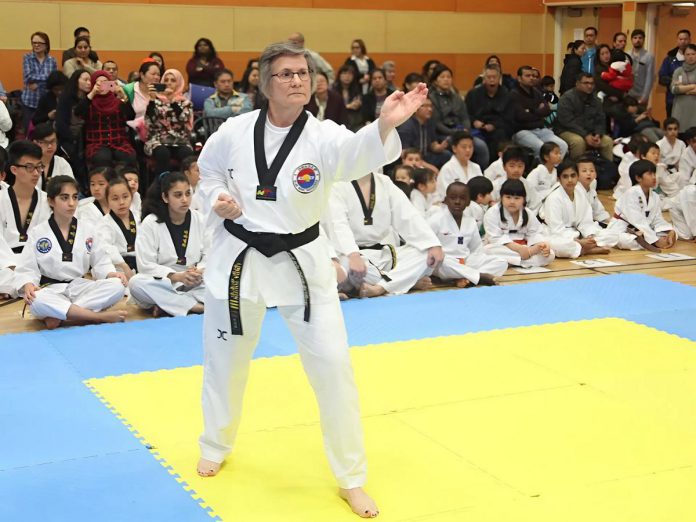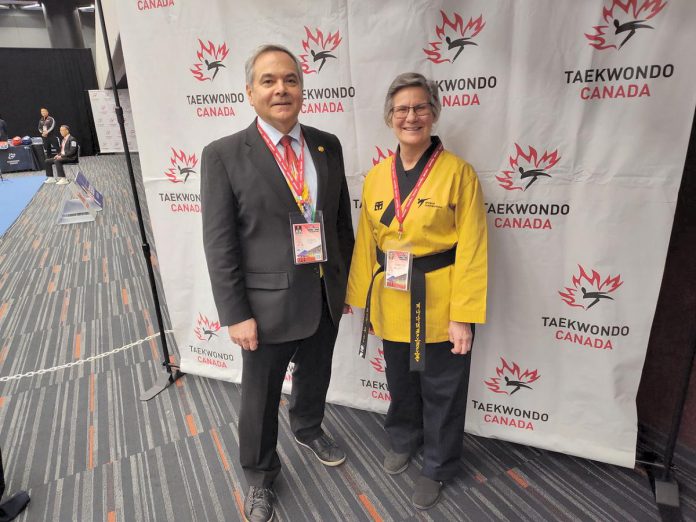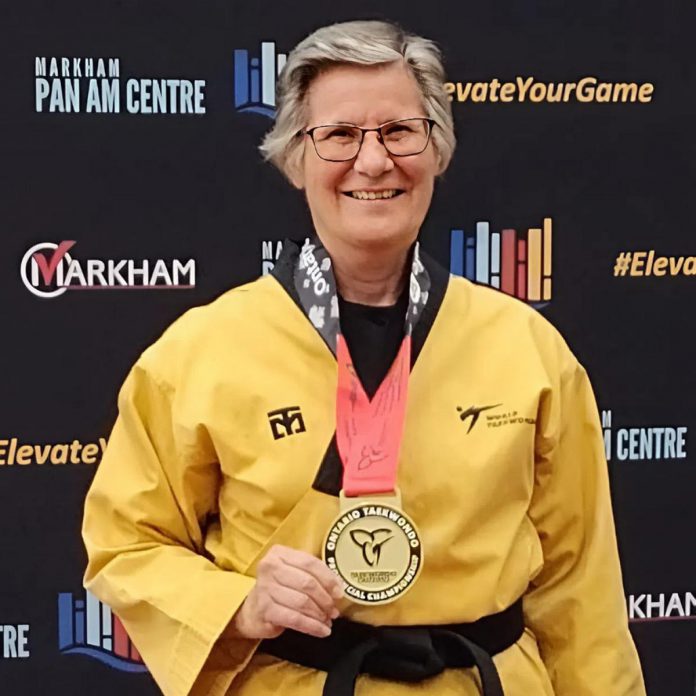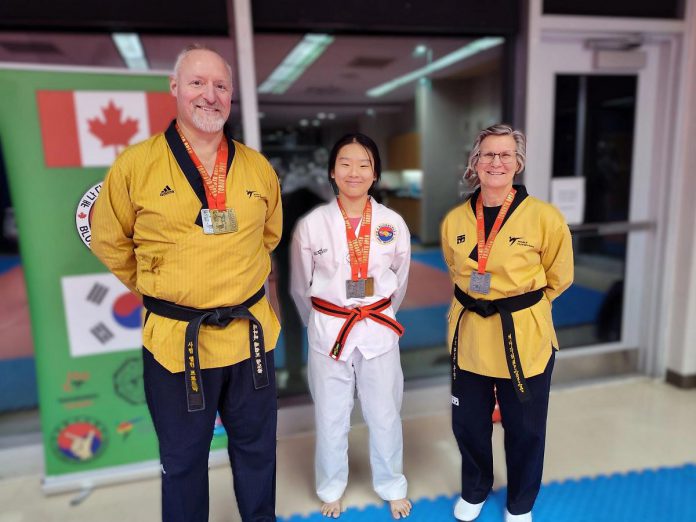
Imagine training for months for just minutes of a competition that requires your entire concentration and focus — you can’t let your gaze stray for even a moment despite an abundance of noise around you.
That is exactly what Linda Touzin will be up against when she competes at the 2026 Taekwondo Canada National Championships from February 5 to 7 in Halifax, where she will represent Ontario, Toronto, and Peterborough — specifically, Blue Wave Taekwondo, a not-for-profit school that supports people training in the martial art and combat sport.
With volunteer instructors, including Touzin who is a co-founder, the club meets every Tuesday and Thursday in various age groups at the Peterborough Sport and Wellness Centre. Living by the motto “Taekwondo for all,” the club is inclusive to all ages, demographics, and abilities, and even supports athletes with competition fees and finances.
“We do it out of giving back to the community,” says co-founder Marcelo Sarkis, who is Touzin’s coach. “What is most important for us at Blue Wave is, at least from the youth side, creating future community leaders that will give back to the community and will respect the environment, respect their fellow individual, and at the same time learn a skill set that can help them throughout their life.”
Now 67 years old, Touzin took up taekwondo 21 years ago to get more exercise. At the time, she never imagined she would have such high aspirations and compete at a national level.
“I just kept going,” she says. “As you get a new belt level, you learn new things. There’s always more challenges, more things to learn, refining techniques that you’ve learned before. All of that really kept me involved and kept me going through all those years.”

Touzin earned a silver medal at the 2025 Taekwondo Canada Nationals in Montréal in February this year, and in October earned gold at the 2025 Taekwondo Ontario Team Selection Games in Markham.
Touzin competes in the poomsae category, which involves sequences of choreographed non-contact defensive and offensive movements performed in a set pattern. A Korean word meaning “form” or “pattern,” poomsae is used in taekwondo to develop technique, precision, and mental discipline.
“Not only is poomsae a way to practise your techniques when you don’t have a partner, but it also acts as a form of meditation because you’re executing it on your own,” says Sarkis. “You’re not just being assessed physically, but you’re being assessed mentally, and part of the presentation is also spiritual.”
At a high level of performance competition, athletes are required to perform random poomsae — forms that are randomly selected on the spot, testing their ability to execute any required poomsae with precision, adaptability, and readiness — and are then judged based on accuracy and presentation.
The judges will evaluate Touzin on how disciplined she is in her pose, including whether her gaze is focused, whether she’s confident, and whether she’s keeping her head up.
“You must be mind over body and you’re controlling the situation,” says Sarkis. “No one else is there to assist you with that performance.”

This is why during training, Touzin prepares not only for the competition physically by learning all the poomsae, but mentally as well. At Blue Wave Taekwondo, the other members all have fun trying to distract Touzin as she’s practising so she learns to maintain focus and composure.
“You have one minute of intense focus and part of doing that is just the repetition. Repeat, repeat, repeat — doing your poomsae over and over and over again many, many times so that it becomes almost instinctive,” Touzin says.
“Then the other aspect is trying to focus during many distractions, so putting me in different situations where people are talking, people are calling to me, people are doing a different pattern beside me, or walking in front of me — any distraction so that I can learn to focus, because that’s a huge part of it.”
Though Tourzin will be competing in the over 65 female category against athletes from other provinces when she’s at the nationals, Touzin says its only herself she will be looking to beat.
“I find it a little bit easier mentally to say ‘This time I’m going to do better than last time,'” she explains. “If I win, yay, all the better. That would be great. It would be great for me, it would be great for the club, it would be just great overall, or if I medalled, regardless of the medal. But I find if I can make improvements every time I compete, I’m happy with that.”
Though Touzin had to push herself to engage in competition the first time, she now finds it to be “addictive.”
“It pushes you to refine your technique,” she says. “It really pushes you because you don’t want to go and not do well. It forces me to practise more and not to be complacent and not say ‘I don’t feel like doing that anymore’ because it’s not easy.”

Though Blue Wave Taekwondo has members from the age of seven to Touzin’s age, she says she notices that the number of athletes at competition level does “drop off quite a bit” after the 30 to 40 age groups, and there aren’t as many people competing in her age category.
For his part, Sarkis says this is changing, partly because of poomsae’s accessibility for older adults. Like tai chi, the Chinese martial art that has evolved into a form of exercise and meditation, poomsae is a non-contact sport. However, unlike tai chi with its slow and flowing movements, poomsae emphasizes sharp and powerful movements and strong stances for taekwondo techniques like blocks and punches.
“We are seeing more and more individuals who are older showing interest in competing in poomsae,” he says, noting it’s a relatively new category at the provincial and national levels in comparison to kyorugi (sparring). “I think we’re going to see an upward trend just because of the benefits of poomsae for older individuals.”
Among these benefits are improved balance, strength, bone health, and flexibility.
“And you can do taekwondo anywhere,” Sarkis adds. “You don’t need to go to a gym. You don’t need to have weights — it’s just mostly body weight exercises.”
Touzin also wants to see more women engaging in the sport, noting “it’s not just for young people, and it’s not just for boys and men.”
“We do have a strong female demographic at Blue Wave that’s very competitive and very successful,” Sarkas agrees. “They look up to Linda as a mentor when it comes to competition. She’s constantly pushing herself outside that envelope, so they say ‘If she can, so can we.'”
For more information about Blue Wave Taekwondo, visit bluewavetaekwondo.ca.


























